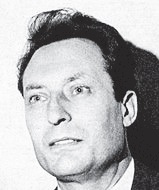REVIEW POTPOURRI – Conductor: Carlo Maria Giulini
 by Peter Cates
by Peter Cates
Carlo Maria Giulini
Italian conductor Carlo Maria Giulini was born May 9, 1914, and passed away June 14, 2005. He displayed talent by the age of five on the violin, but took up the viola as an adolescent, was gainfully employed in Italian radio orchestras, and had priceless opportunities to observe an array of some of the greatest conductors of the last century – Wilhelm Furtwangler, Arturo Toscanini, Victor de Sabata, Bruno Walter – Giulini once commented that Walter had a unique gift for making each musician feel important, Fritz Reiner, and Hancock Maine’s summer resident/teacher Pierre Monteux.
Giulini was taking up conducting himself and getting a few engagements but World War II broke out and he was conscripted into the Italian army. Being a pacifist, he couldn’t bring himself to kill enemy combatants, especially alongside German soldiers, and became a deserter, going into hiding until the allies removed Mussolini from power and drove out the Germans. During the period of hiding, his face was displayed on posters all over the countryside with orders to shoot on sight.
After the war, Giulini got numerous engagements as a guest conductor, and in 1949, was rehearsing a lesser known opera by Franz Joseph Haydn at La Scala; Toscanini happened to look in, stayed for the rehearsal, and used his influence to solidify Giulini’s engagement as La Scala Music Director Victor de Sabata’s main assistant at that opera house, eventually replacing Sabata when the older man’s health failed.
In 1955, Chicago’s own arch perfectionist Fritz Reiner told his players just before he went away for the summer that the very talented young man Giulini will be conducting them for the orchestra’s outdoor festival at Ravinia and the players will be finding the young Maestro a very gifted musician.
Years later in a New York Times interview, Giulini told of meeting Reiner just once in the lobby of a Viennese hotel and having a pleasant chat for 15 minutes.
Giulini’s working methods were quite lengthy and carefully detailed but singers and musicians enjoyed working with him because he knew exactly what he was doing yet had a very pleasant supportive personality, unlike such tyrants as Reiner, Szell, Toscanini and others. He considered them colleagues and friends and that he and they were servants of the great composers – Mozart, Beethoven, Schubert, Brahms, Verdi, Mahler and a handful of others, he being also highly selective of which piece to focus on.
For example, he conducted Tchaikovsky’s 6th or Pathetique Symphony but the 5th Symphony made him physically ill.
In 1979, I attended a concert at Boston’s Symphony Hall in which Giulini conducted the touring Los Angeles Philharmonic, of which he was music director from 1978 to 1984, in a program consisting of Beethoven’s Pastoral Symphony and the Dvorak 7th, two works which he adored and brought something truly beautiful that Sunday afternoon. I own the three recordings he did of the Pastoral and both Dvorak 7ths and they are all good for different reasons.
Two highly recommended operas that Giulini recorded during the 1980s were Verdi’s Rigoletto and Il Trovatore, both with tenor Placido Domingo singing important roles and, even though he had a voice I didn’t usually care for, he sang with beauty and power while still in his 40s.
During roughly the same decade, Giulini refused all engagements for two to three years when his wife Marcela suffered a series of strokes and stayed home to take personal care of her until she recovered.
Many of the Maestro’s recordings can be heard via YouTube and other Internet sources.
A quote by the Maestro on working with people:
“What matters most is human contact. The great mystery of music making requires real friendship among those who work together. Every member of the orchestra knows I am with him and her in my heart.”
Responsible journalism is hard work!
It is also expensive!
If you enjoy reading The Town Line and the good news we bring you each week, would you consider a donation to help us continue the work we’re doing?
The Town Line is a 501(c)(3) nonprofit private foundation, and all donations are tax deductible under the Internal Revenue Service code.
To help, please visit our online donation page or mail a check payable to The Town Line, PO Box 89, South China, ME 04358. Your contribution is appreciated!



Leave a Reply
Want to join the discussion?Feel free to contribute!